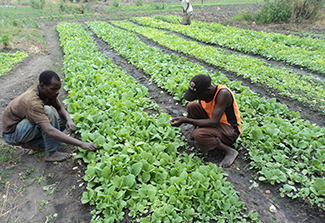NIH grantees study economics of tobacco farming
November/ December 2021 | Volume 20 Number 6
By Mariah Felipe
 Photo by Donald MakokaNIH-funded researchers are studying the political economy of tobacco farming in countries like Malawi.
Photo by Donald MakokaNIH-funded researchers are studying the political economy of tobacco farming in countries like Malawi.
Many subsistence farmers in developing countries choose to plant tobacco, with the assumption it is the most profitable crop choice. This myth perpetuated by the tobacco industry not only causes financial hardship and food insecurity for many farmers and their families, but it also increases the supply of cheap tobacco and encourages its consumption, according to a team of scientists supported in part by the National Cancer Institute.
Tobacco use is the leading preventable cause of premature death, killing about 8 million people each year. There has been a recent marked shift in the burden of tobacco to low- and middle-income countries (LMICs)—where an estimated 80% of tobacco consumption now occurs—posing an enormous health and economic burden, according to the WHO.
With a series of grants made through Fogarty’s tobacco cessation research program, Dr. Jeffrey Drope and his collaborators have studied the economic lives of tobacco farmers in several LMICs, and the political and economic processes that frame their livelihoods. They first examined existing literature and then surveyed nationally-representative samples of farmers in Kenya, Malawi, Zambia and Indonesia to determine why they choose to grow tobacco over other crops such as peanuts, green vegetables or corn.
"No small-scale farmer profits from tobacco-growing," said Dr. Fastone Goma, a research partner at Zambia’s Eden University. "If you factor in unpaid family labor, all of these farmers make huge losses. All other crops proved to be more profitable to grow in these regions."
The researchers discovered that one of the main barriers to change was the farmers’ lack of credit, necessary to switch to another crop. “These farmers are very capital poor, very cash poor. They don’t have extra money to buy seeds and fertilizer,” said Drope, who previously was head of economic and health policy research at the American Cancer Society and now is with the University of Illinois at Chicago. Since the tobacco industry will loan farmers what they need to grow tobacco up front, it makes it an appealing prospect. Another obstacle is farmers’ lack of knowledge of how to grow other crops. Many LMICs have cut their budgets for educational services, which used to provide information on how to best cultivate specific crops to enhance the yield, Drope noted.
An important component of the project has been presenting the results not only to policymakers but also to the farming communities. “They eat it up and ask tons of questions,” Drope said. When the farmers understood their lack of access to capital was undermining their ability to make money, they formed cooperatives to pool resources. The farmers also learned by example, observing one who switched to growing potatoes and was able to purchase a vehicle after his first harvest, something he couldn’t afford when growing tobacco.
A central aim of the work has been capacity building. In this case, Drope and his collaborators established programs in these countries and supported researchers' efforts to continue long after the study ended. "We worked with countries to develop a cadre of engaged individuals who cared, knew what the problems were, and sought out solutions," said Drope. "We now have masters- and Ph.D.-level researchers who can do this detailed work and are true collaborators by every definition of the word."
Overall, the scientists’ goal is to provide research that results in policy changes. Citing previous global modeling, Drope noted that a 40% rise in prices from increased excise taxes on tobacco could save more than 20 million lives over 50 years. But when he presses policymakers on the issue, they cite fears it would result in starving farmers and a black market in tobacco. Drope hopes his team’s research debunking these tobacco industry yarns will bring change. But it’s challenging to argue for taxation in countries like Indonesia, with a tiered tax structure and nationally branded cigarettes, said collaborator Dr. Gumilang Sahadewo, of the Universitas Gadjah Mada. "There is an intersection between nicotine addiction and local pride in having a national product, despite the significant public health cost,” he said.
Their research results are now being considered by national governments and international organizations like the WHO, which is working to help farmers switch to alternative crops, according to Dr. Peter Magati, a collaborator in Kenya and now WHO consultant. "It is all about evidence and truth. That is what science and research are,” said Magati. “We will keep on researching and seeking the support to do what we do best."
More Information
To view Adobe PDF files,
download current, free accessible plug-ins from Adobe's website.
Related Global Health Research Topics